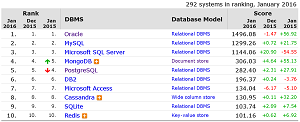News
Oracle Named 'DBMS of the Year 2015'
- By David Ramel
- January 14, 2016
Like an aging fighter fending off younger foes, Oracle rose above its upstart NoSQL and open source challengers to be named DBMS of the Year for 2015.
That coronation was bestowed by DB-Engines, a knowledge base of relational and NoSQL database management systems (DBMS) that tracks more than 290 individual products.
DB-Engines uses a multi-faceted ranking system based on mentions in search engines, Google Trends data, discussions on coding sites, job offers, inclusions in LinkedIn profiles and the number of related tweets on Twitter.
Much like programming language popularity indices, the DBMS of the Year designation is based on the increase of popularity from one year to the next. In this case, DB-Engines uses the raw difference in numbers, rather than measuring the percentage increase, because the latter method "would favor systems with a tiny popularity at the beginning of the year."
Last year's strong showing for Oracle is nothing new, Paul Andlinger and Matthias Gelbmann of DB-Engines said in a blog post last week announcing the 2015 results.
 [Click on image for larger view.]
The Top 10 (source: DB-Engines)
[Click on image for larger view.]
The Top 10 (source: DB-Engines)
"Oracle is the clear leader in the DB-Engines Ranking since we started more than three years ago," they said. "Its ranking score saw some ups and downs in that period, but 2015 was an exceptionally good year for Oracle, gaining 56.9 scoring points."
Coming in as runner-up was the MongoDB document store database, which moved up one notch in the overall scoring system, replacing PostgreSQL in the No. 4 slot and enjoying the status of the most popular NoSQL system.
In third place was Cassandra, the most popular wide column store database, which came in eighth overall.
In terms of overall scoring -- not the increase in popularity -- relational databases recovered from a two-year drop in popularity to gain leadership positions over the NoSQL upstarts, with the top 10 databases for 2015 being:
- Oracle
- MySQL
- Microsoft SQL Server
- MongoDB
- PostgreSQL
- DB2
- Microsoft Access
- Cassandra
- SQL Lite
- Redis
DB-Engines said the new rankings don't indicate an end to the NoSQL hype, for three reasons.
"First, considering the number of projects that use NoSQL systems nowadays, many of them very complex and mission-critical, it is not justified to call it a hype, probably never was," DB-Engines said. "Second, although a RDBMS won our DBMS of the Year award this time, NoSQL systems are still doing very well in our ranking. Besides MongoDB and Cassandra, other leading NoSQL systems such as Redis, Neo4j and Couchbase also had a very good year. And third, if anything comes to an end, then it's probably the strict distinction between RDBMS and NoSQL."
That distinction is fading, DB-Engines said, as each database camp picks up features previously associated with other systems. For examples, it notes Oracle supported non-relational collections long before NoSQL came into being, and NoSQL systems themselves have been evolving by supporting more SQL-like technologies.
DB-Engines said an uptick in social media metrics contributed to Oracle's strong performance. "While Oracle was always very strong in ranking categories such as job offers and LinkedIn profiles, last year it was catching up in its relatively weaker categories such as StackOverflow discussions and Tweets," it said.
Surprisingly, Microsoft SQL Server was the biggest loser over the course of 2015, suffering nearly a 55-point drop (though still coming in at No. 3 overall). That might change this year, as a little product called SQL Server 2016 is expected to drop (or else they have to change its name).
About the Author
David Ramel is an editor and writer at Converge 360.